A co-designed Climate Science collaborative
Braiding ways of knowing and doing into Climate Science
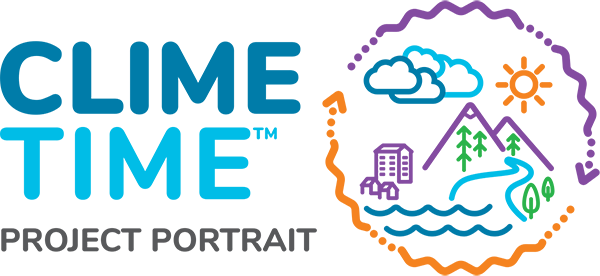
The ClimeTime learning experiences for teachers supported by Braided Education Consulting was supported through the co-design of a culturally responsive curriculum unit focused on climate change phenomena to be used in schools serving students from the Confederated Colville Tribes.
Overview
The project team engaged a group of classroom and environmental educators, tribal elders, tribal scientists, and university staff in a shared learning experience focused on curriculum development. The goal is for the classroom teachers to learn: (a) how Tribes on the Okanogan Highlands and the Columbia Plateau maintain right relationships with water, plants, and land through traditional tribal knowledge, (b) how to collaborate with tribes on the centering of tribal knowledge, perspective, and history in curriculum, (c) how to engage in professional learning alongside others within community (e.g., through the sharing of stories, through place-based sense-making through field excursions, by co-designing educational artifacts as a group) and to braid multiple ways of knowing and doing into professional development.
What We Did
This model of curriculum development—and the underlying professional learning needed to engage in that work—is an expression of Indigenous sovereignty over public education. The curriculum development effort is focused on recentering learning about changes in the ecosystem from the perspective of the Tribal community and the inclusion of traditional ecological knowledge (TEK).
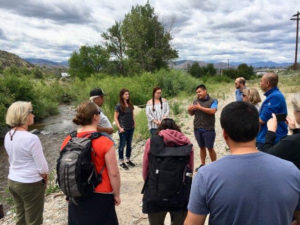 The approach involved an important sequence of shared activities from June 2019 to the present to support the learning and design work of the group. First, this included listening to and learning from the stories of elders as a way to understand tribal history, multiple dimensions of how climate change is impacting tribes (e.g., social, economic, cultural), and the ongoing work of tribal governance and leadership. This helped center the work on traditional stories and practices that are culturally significant to the Colville community. Second, tribal experts in natural resources presented on a range of hyper-local phenomena caused by climate change and how the tribal community was responding—including the details of their vulnerability report being developed. Third, the group went on specific excursions into the field to support place-based learning about specific sites of restoration for the purposes of sacred practices to the tribal community. Fourth, an exploration of historical video footage highlighted the sacred relationship to Salmon, associated practices, and relevant tribal creation stories. This specific focus of human-nature relations between the Colville tribe and Salmon ultimately became a central focus to the curriculum development work of the group.
The approach involved an important sequence of shared activities from June 2019 to the present to support the learning and design work of the group. First, this included listening to and learning from the stories of elders as a way to understand tribal history, multiple dimensions of how climate change is impacting tribes (e.g., social, economic, cultural), and the ongoing work of tribal governance and leadership. This helped center the work on traditional stories and practices that are culturally significant to the Colville community. Second, tribal experts in natural resources presented on a range of hyper-local phenomena caused by climate change and how the tribal community was responding—including the details of their vulnerability report being developed. Third, the group went on specific excursions into the field to support place-based learning about specific sites of restoration for the purposes of sacred practices to the tribal community. Fourth, an exploration of historical video footage highlighted the sacred relationship to Salmon, associated practices, and relevant tribal creation stories. This specific focus of human-nature relations between the Colville tribe and Salmon ultimately became a central focus to the curriculum development work of the group.
What We Learned
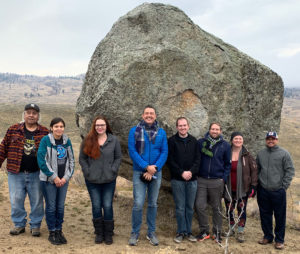 The collaborating group engaged in the sequence of meaningful activities described above over the past year. This resulted in the drafting of a shared curriculum unit that is being iterated upon and the shifting of classroom practice for the teachers involved. The group started by learning about the Colville cultural history, significant places in the region, and hyper-local climate change related phenomena (e.g., mega fires and flooding, impacts on food production in the region and the need for food sovereignty, impacts of warming creeks on wildlife like salmon). This initial development of a shared understanding shaped the ongoing effort of the group to identify the protection of salmon through restorative efforts as the focus of the unit.
The collaborating group engaged in the sequence of meaningful activities described above over the past year. This resulted in the drafting of a shared curriculum unit that is being iterated upon and the shifting of classroom practice for the teachers involved. The group started by learning about the Colville cultural history, significant places in the region, and hyper-local climate change related phenomena (e.g., mega fires and flooding, impacts on food production in the region and the need for food sovereignty, impacts of warming creeks on wildlife like salmon). This initial development of a shared understanding shaped the ongoing effort of the group to identify the protection of salmon through restorative efforts as the focus of the unit.
By having the work take place within a specific tribal community context it allowed the group to build capacity for a culturally resurgent, land-based approach to Tribal history and specific future plans. Community members and teachers have no memory of Colville tribal history ever being taught at the public middle school in their small town. This project allowed for this to happen.
A middle school teacher at the public middle school has described how he has come to really appreciate the Colville students in his classes and how the perspective of the Colville tribal community about the ecosystem is different than his own; he had wanted to explore tribal history and perspective, but did not have a way to do so before this collaboration. This personal account of professional learning has shifted his classroom instruction— and this has been documented in the classrooms of the other teachers involved. These shifts have often been facilitated through a co-teaching arrangement that includes Colville tribal members working with specific teachers—at least initially.
This work can be viewed as a capacity and infrastructure development effort focused on racial justice—to work to ensure that the school curriculum includes tribal history and knowledge—now a WA state legal requirement. This work can also be viewed as a climate justice effort—in that it is focused on the thriving of the ecosystem and the cultural resurgence of indigenous lifeways across generations.
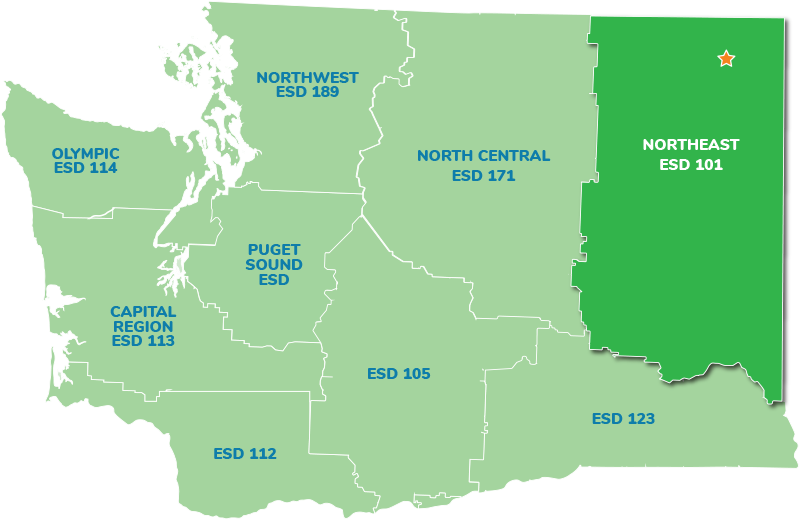
Project Partner
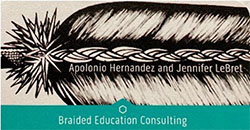
Contact
For more information contact:
Jen LeBret
jen.lebret@gmail.com
Polo Hernandez
braidededconsulting@gmail.com
